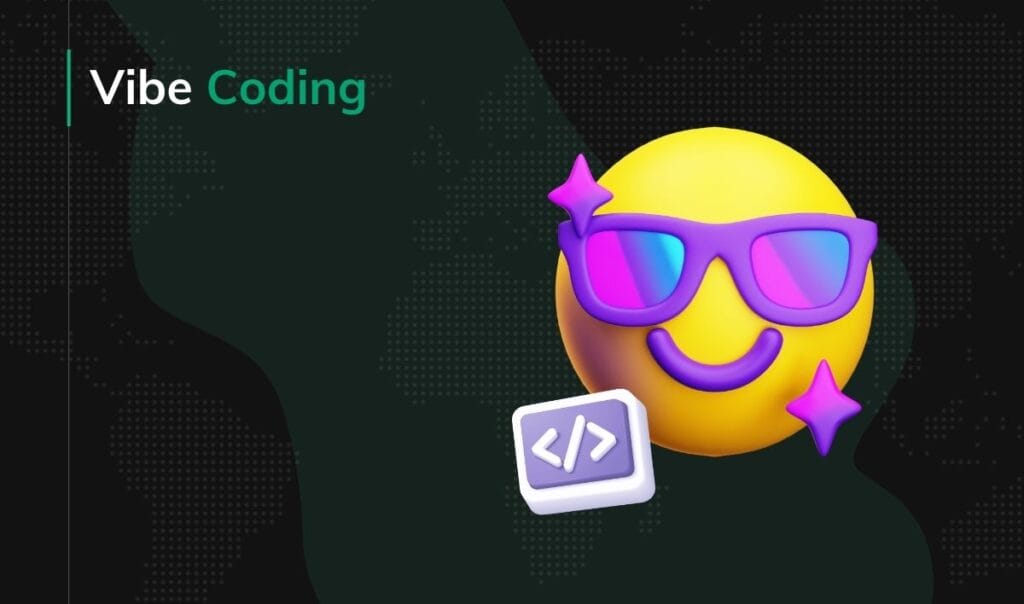SaaS is dead? How AI agents reduced SaaS to just an API. AI agents vs SaaS
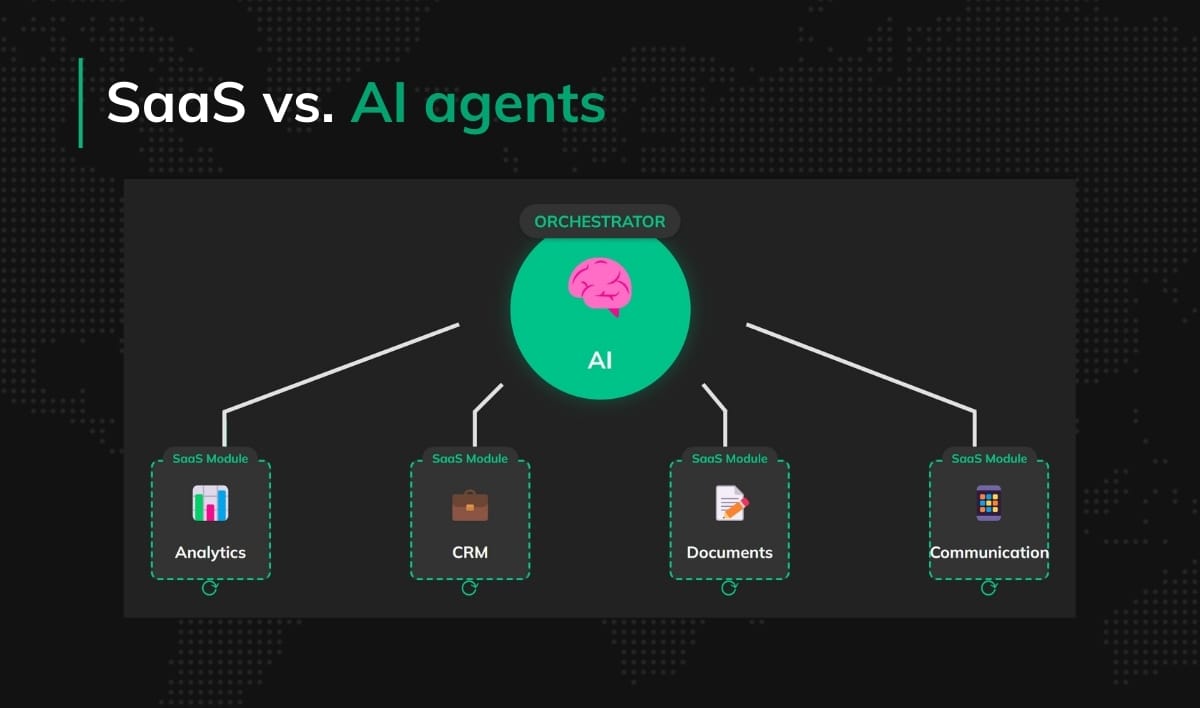
Will SaaS become obsolete?
Will user interfaces disappear?
Or will SaaS evolve into a new integration layer for AI?
As AI agents gain autonomy in software interactions, the question arises: will SaaS as we know it survive?
Recently, I stumbled upon an interesting doc and a no less interesting Hacker News discussion What happens to SaaS in a world with computer-using agents? Is this the decline of traditional Software as a Service (SaaS) and the rise of a new model: AI as a Service (AaaS). In the AaaS paradigm, the value is no longer in UI, but in the intelligent agent that gets the job done.
Below, I’ve summarized and presented the observations from the community in a more digestible form.
AI agent development services
What Happens to SaaS in a World with Computer Using Agents?
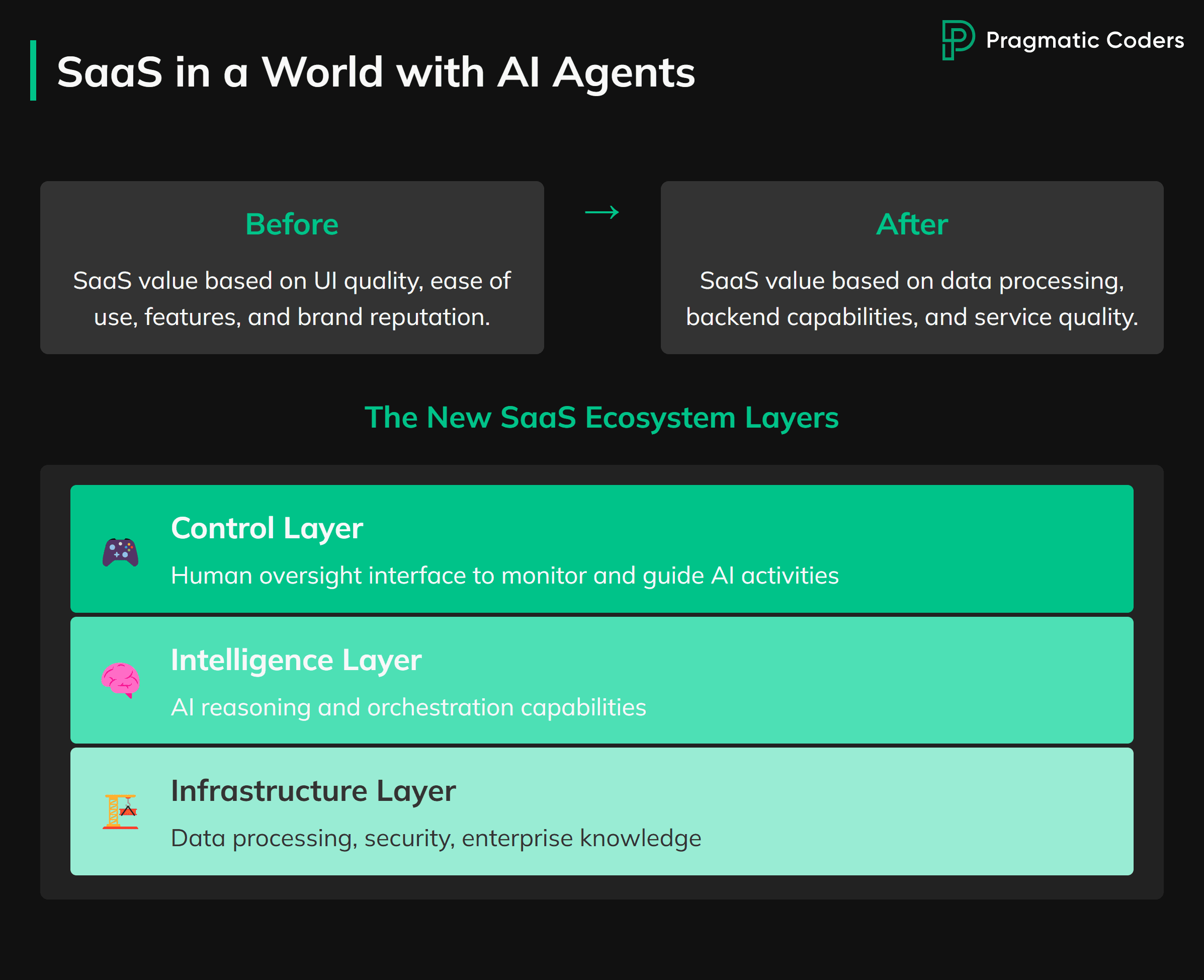
In his article “What Happens to SaaS in a World with Computer Using Agents?”, Stephen Coyner proposes that SaaS could transform into a backend layer, with user interfaces becoming redundant as AI agents take over interactions. Before diving into the broader discussion, let’s summarize the main points of Coyner’s argument:
- Context: We are entering an era where AI agents can use software just like humans do, but more efficiently. Companies like OpenAI and Anthropic are developing AI that can autonomously interact with complex applications. The author cites Anthropic’s CEO, Dario Amodei’s, prediction of a “virtual collaborator” potentially arriving “this year and maybe even in the first half of this year.” These agents will be faster, and more knowledgeable (via long context windows); they will work tirelessly 24/7.
- Example: Traditionally, a sales rep would manually log interactions into a CRM. In this new AI-driven world, an agent would record conversations, analyze customer interactions, and suggest the next steps—all without human intervention.
- So what? Before, a SaaS product’s competitive edge was directly proportional to the quality of its user interface, ease of use, specialized features, and brand reputation. Yet, if AI now handles all interactions, SaaS could lose its front-end relevance, reducing its differentiation to data storage and process execution.
- Layers of the agent software ecosystem: SaaS would transform into three layers:
- Infrastructure Layer (data processing, security, enterprise knowledge). Palantir is cited as an example of a company already building this layer.
- Intelligence Layer (AI reasoning and orchestration – OpenAI, Anthropic, etc.).
- Control Layer (interface for human oversight).
- Natural consolidation: If AI integrates various SaaS tools automatically, businesses may shift to fewer, more unified platforms instead of fragmented applications.
- Today’s market: Companies like Palantir and OpenAI are already positioning themselves to lead this transition by offering AI-driven business orchestration.
Now, let’s break down the key arguments for and against this vision.
1. Will AI replace SaaS user interfaces?
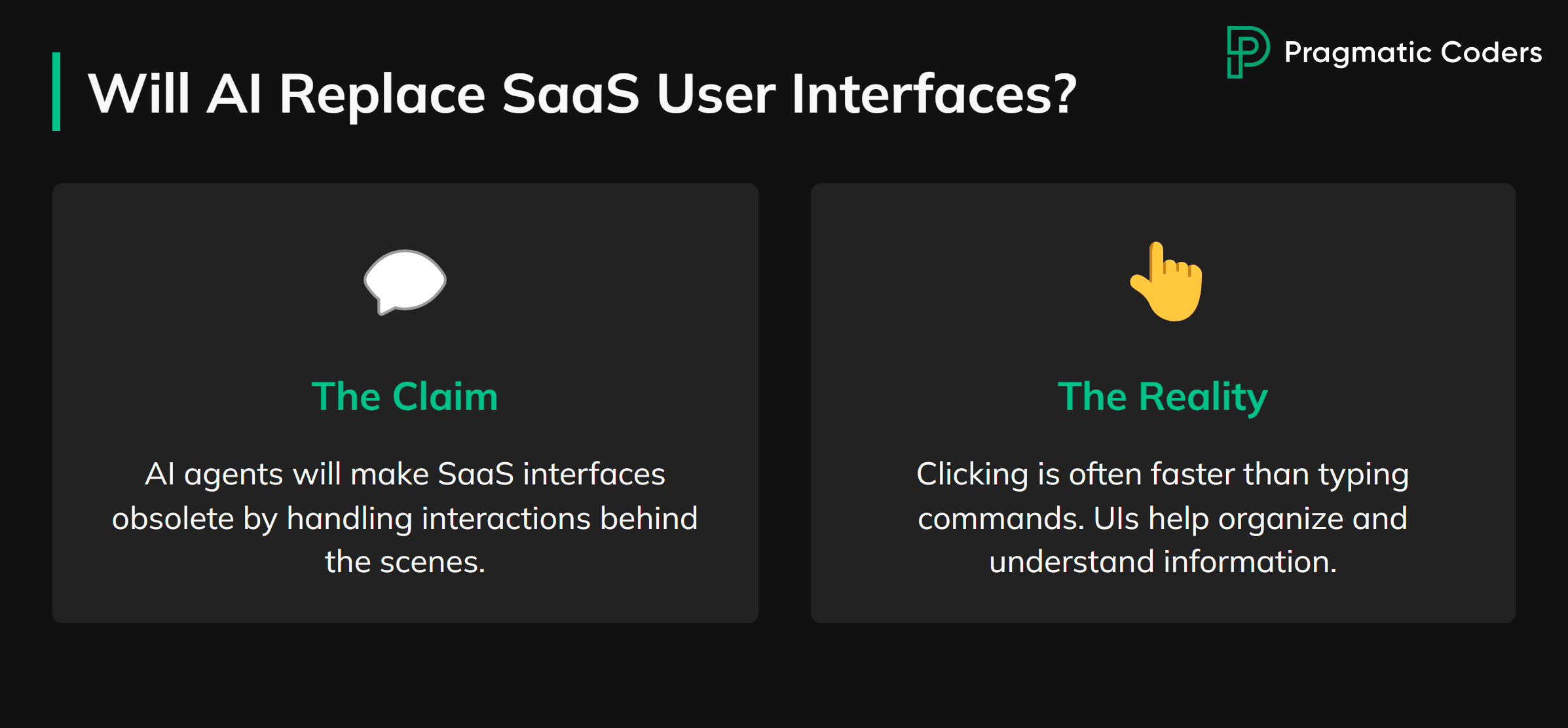
One of the boldest claims in this discussion is that AI agents will make SaaS user interfaces obsolete. Instead of users clicking through dashboards, AI will retrieve and process data behind the scenes, and present only the final results.
Supporters say this removes UI friction. In theory, you could focus solely on high-level decision-making. Critics, however, point out that UIs are not just about interaction but also about understanding and organizing information. Even if AI takes over most interactions, will users be comfortable with losing direct control?
Bjorkbat draws a parallel to past chatbot hype:
This reminds me of the hype around chatbots a few years ago. Everyone thought we’d do everything through chat interfaces, but in many cases, traditional UI design turned out to be much more efficient.
Bashtoni adds:
Do I really want to type ‘Show me all the calls I had today’ instead of just clicking twice? For many people, clicking is simply faster.
Some believe that a well-designed UI will always be more efficient than interacting solely through natural language. An LLM is not always the best interface, particularly for data access. For most people, clicking a few times in the right places is preferable to having to type out (or even speak aloud) ‘Show me all the calls I did today’, waiting for the result, having to follow up with ‘include the time per call and the expected deal value’, etc etc. (bashtoni).
| While we’re diving into how AI might change the way we interact with software, you might want to check out our article on another hot topic: Will AI replace programmers? |
2. AI as an orchestrator and the commoditization of SaaS
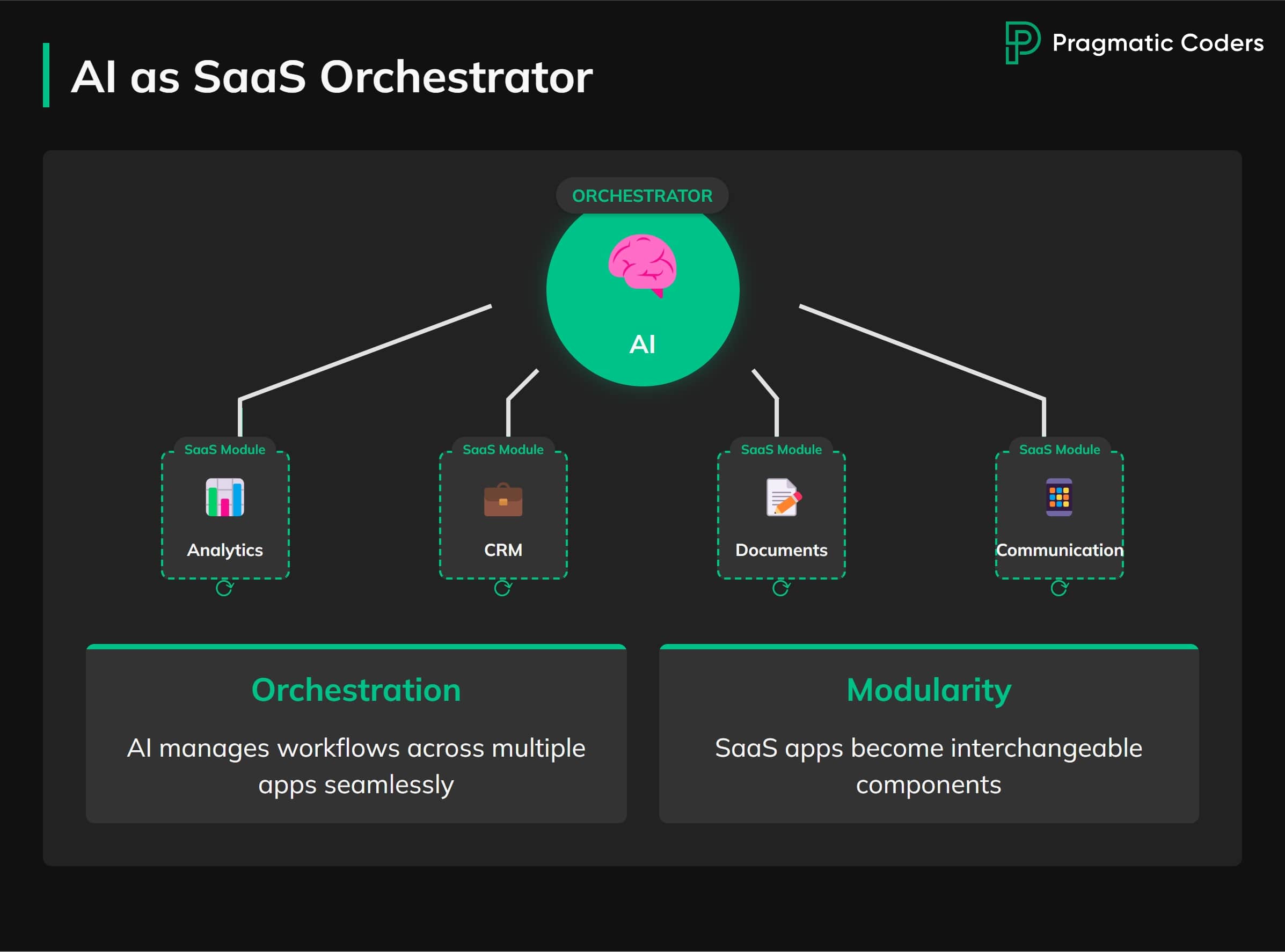
Instead of fully replacing SaaS interfaces, AI may evolve into an orchestrator, managing workflows across multiple applications, so that the interactions between different SaaS components are seamless.
In this model, SaaS applications become modular and interchangeable. AI agents dynamically select, integrate, and use SaaS components, much like how WordPress plugins work. Instead of monolithic applications, businesses may adopt a collection of microservices that AI can switch in and out as needed.
This shift has two major implications:
- AI as an orchestrator: AI handles coordination between different SaaS tools, and dynamically integrate their functionalities.
- SaaS as commoditized plugins: SaaS providers may struggle to differentiate themselves if their products become just another interchangeable tool that AI agents can swap out at will.
Guybedo describes this shift:
The future is SaaS as a set of modular components + AI as the orchestration layer + specialized UI where necessary.
S__s takes it further:
If the UI is no longer needed, SaaS is reduced to just a database and a set of functions that an AI agent can swap in and out at will.
This shift isn’t hypothetical: we are already seeing the first casualties. A prime example is the recent restructuring at Tailwind Labs, creators of the popular Tailwind CSS framework, who laid off ~75% of their team.
As Tomasz Karwatka points out, Tailwind became a victim of its own success in the LLM era. They perfected one thing: turning UI into structured, predictable data. While this made them a global standard, it also made them “perfect food for AI.”
The Business Model Trap: Tailwind Labs monetized through Tailwind UI (paid component kits). But today, AI models like GPT-4o or Claude can generate perfect Tailwind code in seconds, effectively replacing the need to buy static templates.
The Platform Gap: Tailwind created a syntax, not a system. They lacked the enterprise layer (governance, workflow, compliance, or a cloud platform) that companies are willing to pay for.
The lesson for SaaS founders? In the age of AI, standards and syntax become free. If your product is merely a utility or a UI layer without a deep system or platform lock-in, AI will commoditize it faster than you expect.
Bradchris raises concerns about the impact on business models:
A big part of what B2B SaaS companies sell isn’t just the software itself, but support, compliance, and integration. How do AI-driven SaaS replacements handle that?
AI-friendly SaaS: The need for “legal” API access
One of the key challenges of this transition is that AI agents currently interact with SaaS in unpredictable ways; they often act as smart scrapers or automated bots navigating UI elements. This is inefficient and, in many cases, unwelcome by SaaS providers.
As my colleague noted, businesses will eventually get frustrated with AI agents acting like “smart crawlers” that explore and interact with software in unintended ways. Instead, SaaS vendors will likely start offering official API access tailored for AI agents, ensuring that AI can interact in a structured and controlled manner.
So, how should SaaS adapt to AI-driven workflows?
I’m curious about how APIs and services will need to evolve for AI agents. Much like how Make.com lets you connect services as building blocks, SaaS should expose AI-specific interfaces—something like structured metadata for AI, similar to how websites tag content for Google. Those who don’t provide such interfaces will lose out, as AI-driven automation will favor accessible and well-integrated solutions.
This means that SaaS providers who fail to adapt to AI-first integrations may become obsolete, while those that offer agent-friendly APIs could gain a competitive edge.
If AI is going to interact with SaaS effectively, new types of API structures are needed. Current APIs are often rigid, requiring predefined calls and responses. Instead, SaaS might need to adopt more dynamic, discoverable, and AI-friendly API layers.
Svilen_dobrev proposes:
We need something between traditional APIs and full UI. Maybe ‘Application Agentic Interfaces’—a middle layer that allows AI agents to dynamically understand what they can do.
3. The ultimate problem of data quality

AI’s effectiveness depends on clean, structured, and well-documented data—yet in the real world, data is often messy, fragmented, and deeply contextual. Many businesses lack structured data models, and critical business logic often lives only in the heads of experienced employees.
Magmalgebra describes their team’s experience with AI-powered reporting:
We built an AI-powered reporting system for Fortune 500 executives. At first, it seemed magical—reports generated in minutes! But soon, we got negative feedback: nearly 90% of the reports were wrong. The issue wasn’t with the LLM—it was with data context. Knowing which data to use required undocumented knowledge, like obscure JOIN ON operations known only to two data scientists.
Similarly, llm_trw highlights the chaos of database inconsistencies:
Unstructured data is often better than databases with dozens of ad hoc tables, each storing similar information slightly differently, built over a decade by different teams. Even if you describe tables to AI, you also need descriptions of the systems writing to them.
Because here’s the catch: AI cannot intuitively understand hidden dependencies, undocumented logic, or evolving business processes. What’s more, some datasets may only be accurate at specific times—for example, when an ETL pipeline has finished updating, as Magmalgebra further explains:
A report was only accurate if generated on a Tuesday or Thursday after 1 PM because that’s when the ETL pipeline runs. A small config change on the opposite side of a codebase completely altered the semantics of the data!
Is data curation worth the effort?
If AI is to fully replace SaaS, businesses must ask: Is it worth structuring data for AI compatibility?
Sansseriff questions whether organizations will ever invest enough effort:
It will be interesting to see in which fields it’s worth curating data to a high enough standard for AI to be truly useful. Will researchers annotate papers, data, and arguments well enough? If they do, would AI-written papers get more citations? Are new publishing formats needed, beyond PDFs?
Meanwhile, Caspper69 argues that not all business knowledge can be captured in structured data:
So much of business is tracking metrics, yes, but numbers never tell the whole story. There’s always a backstory. Some things just can’t be captured in raw data and hence can’t be summarized by AI.
How to improve AI’s understanding of data
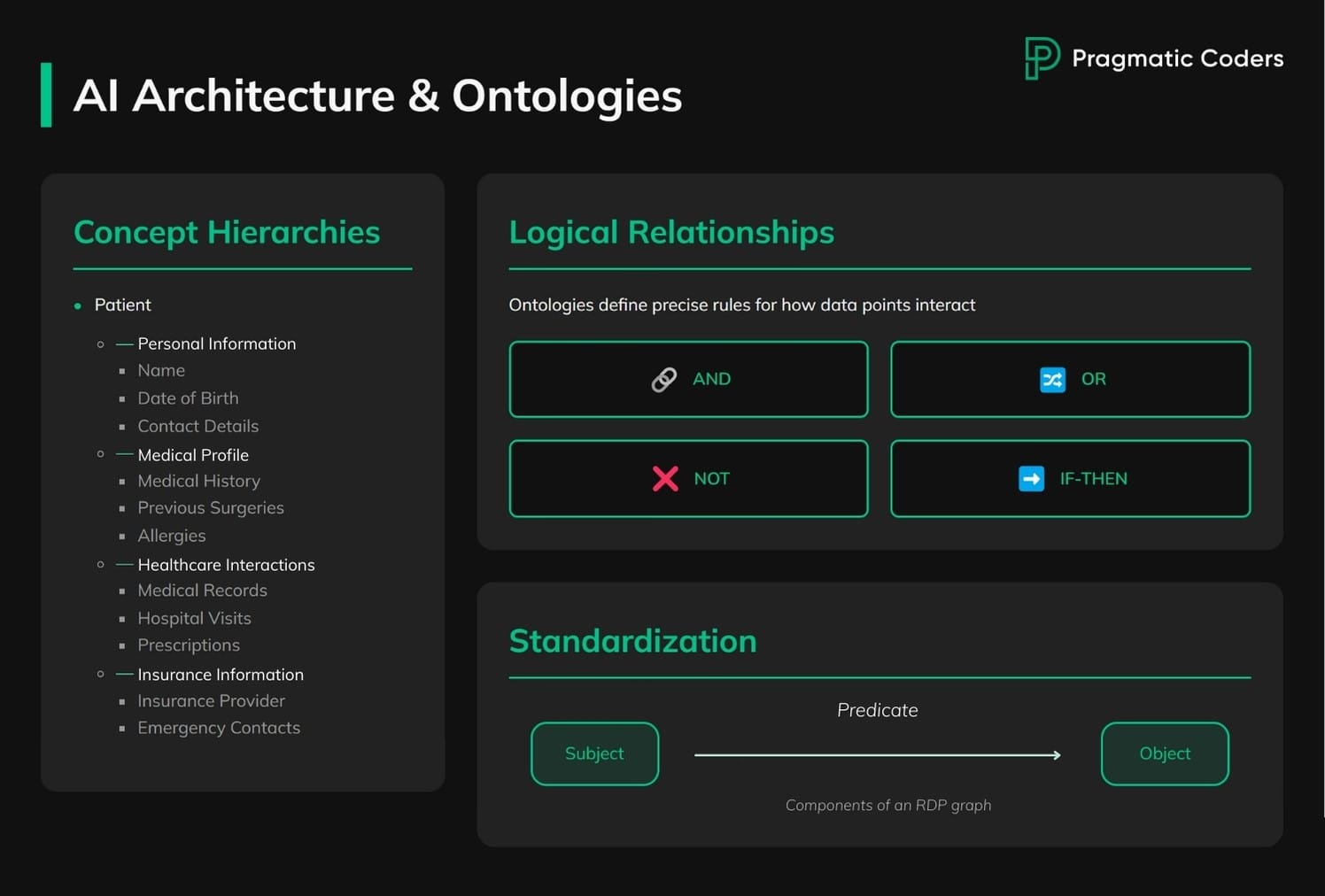
One way to deal with the data quality & content problem is through the use of ontologies – that’s what lukev proposed:
This is absolutely the problem. But there is a line of sight; namely, combining LLMs with existing semantic data technologies (e.g, RDF.) This is why I’m building a federated query optimizer: we want to let the LLM reason and formulate queries at the ontological level, with query execution operating behind a layer of abstraction.
But what exactly are ontologies in this context?
Ontologies are structured representations of concepts, relationships, and rules within a domain (for example, healthcare). They help organize data in a way that machines can understand. Their key aspects are:
- Concept hierarchies – Define objects, attributes, and their relationships.
- Example: A “Patient” in a healthcare ontology might have attributes like “Name,” “Date of Birth,” and “Medical History.”
- Logical relationships – Specify rules for how data points interact.
- Example: “Every patient must have at least one assigned doctor.”
- Standardization – Provide a common vocabulary for different systems to interact.
- Example: Using RDF (Resource Description Framework) or OWL (Web Ontology Language) to define relationships across datasets.
While this looks good on paper, ontologies don’t seem to solve the problem. Magmalgebra noted that even a well-defined ontology does not fully capture implicit rules (e.g., time-sensitive data accuracy):
Unfortunately this doesn’t address the problem I’m describing.
My team had these ontologies available to the LLM and provided it in the context window. The queries were ontologically sensible at a surface level, but still wrong.
The problem is that your ontology is rapidly changing in non-obvious and hard to document ways e.g. “this report is only valid if it was generated on a tuesday or thursday after 1pm because that’s when the ETL runs, at any other time the data will be incorrect”.
Business rules and relationships change over time. Many rules aren’t documented in ontologies and must still be manually maintained. Lastly, they can struggle with edge cases and exceptions that humans naturally understand.
As you can see, there isn’t a single, definitive solution to the problem of data messiness and lack of context, but rather a set of strategies that, when combined, can significantly improve AI’s ability to work with business data.
But even if improved, will it be enough? It looks like a human-in-the-loop approach is the most realistic path forward.
And, finally, it might turn out that the best option is to… not use AI at all. Actually, that’s what Anthropic says at the very beginning of their article Building effective AI agents:
When building applications with LLMs, we recommend finding the simplest solution possible, and only increasing complexity when needed. This might mean not building agentic systems at all.
AI agents vs SaaS
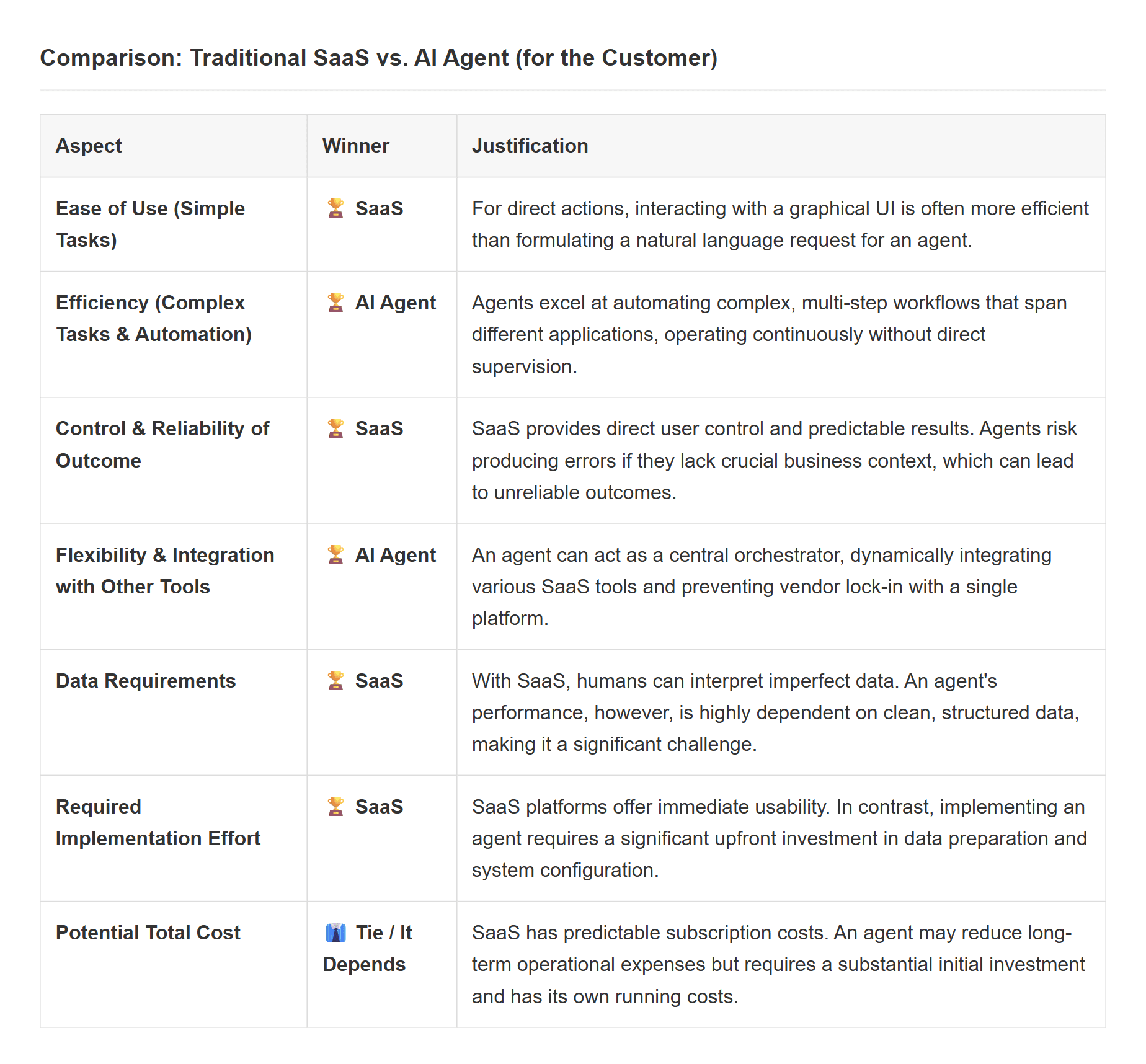
The choice between SaaS and an AI Agent is not straightforward and depends entirely on the customer’s priorities:
- Choose traditional SaaS if: Your tasks are relatively simple, you value full control, reliability, and speed of implementation, and your data is messy or its context is hard to document. In many cases, “a well-designed UI will always be more efficient.”
- Consider an AI Agent if: Your main challenge is automating highly complex, multi-step processes that span multiple applications, and your organization is prepared to invest significant resources in preparing and structuring data to ensure the agent’s reliability. Even then, the most realistic path forward is a “human-in-the-loop” model, where the agent performs the tasks, but a human supervises and verifies the results.
Final thoughts: What’s next for SaaS?
Messy, context-dependent data still limits AI’s reliability. AI agents won’t replace SaaS but will change how we use it. That’s why SaaS decision-makers must adapt by making their platforms AI-friendly.
Thinking about replacing SaaS with AI?
If you’re reading this, there’s a decent chance that your organization is juggling multiple SaaS platforms, and you’re thinking about switching to AI agents. If that’s the case, here’s what we can do for you:
- AI Agent Consultation: We evaluate your current systems and recommend solutions—be it AI agents, optimized SaaS integrations, or a hybrid approach—that align with your business objectives.
- Customized AI Agent Solutions: Our strength lies in developing AI workflows that handle complex tasks and can fit seamlessly into your existing infrastructure.
- AI Integration: For organizations looking to enhance their current SaaS tools, we ensure that AI functionalities are embedded smoothly into your existing platforms – without costly overhauls.
Sounds like something you need? Contact us.
FAQ
What is SaaS?
SaaS, or Software as a Service, is a software delivery model where applications are hosted by a vendor and made available to customers over the internet on a subscription basis. Think of tools like Salesforce, Slack, or Google Workspace. The traditional SaaS model is built around a human user interacting directly with its interface (menus, buttons, dashboards).
What is an AI Agent?
An AI Agent is an autonomous system designed to understand a goal, create a plan, and execute multi-step tasks to achieve it. Unlike a simple chatbot, an AI agent can interact with other software, databases, and APIs to perform complex actions on a user’s behalf, effectively replacing the need for manual interaction with a software interface.
What is AaaS?
AaaS, or AI as a Service, is the evolution of the SaaS model. Instead of paying for access to a software interface (a “seat”), customers pay for an AI agent to perform a specific service or achieve an outcome. In the AaaS model, the AI agent *is* the product. It leverages the APIs of other tools to get the job done, making traditional SaaS applications the invisible plumbing behind an intelligent service layer.






